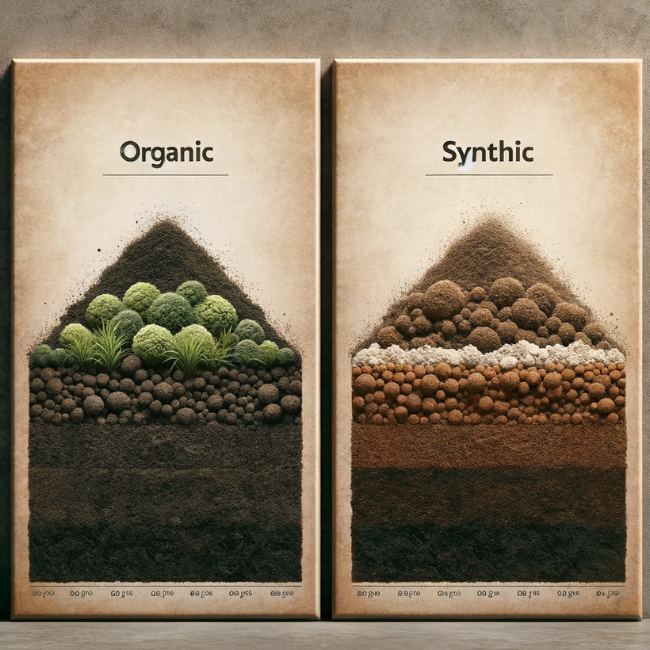Organic fertilizers could play a key role in sustainable agriculture but for more than just their plant-feeding benefits. As an increasing number of countries and people recognize the need for an environmentally friendly approach to food production, organic fertilizers could be part of the solution. Since they not only nourish crops but also improve soils and biodiversity, reduce ecological footprints and can be part of a modern, sustainable approach to farming.
What is Organic Fertilizer?
Definition and Key Components
Organic fertilizer is a substance of organic origin used to improve the yield of plants and their health. Organic fertilizer can be distinguished from its man-made counterparts: inorganic fertilizers, in that the active ingredients originate totally or mainly in a natural environment. Organic fertilizers comprise degradable products that have undergone bacterial fermentation, for example, plant residue, animal manure or composts, and this raises several points of discussion. Organic fertilizers contain essential macronutrients required by plants such as nitrogen (N), phosphorus (P) and potassium (K), as well as a full complement of micronutrients (so-called because they are needed in very minute quantities) all of which play important roles in plant functions.
Types of Organic Fertilizers Available
Considerable selection has developed in the field of organic fertilizers, with various advantages of each. Some common types include:
- Animal-based fertilizers: Manure, bone meal and fish emulsion are all packed with nitrogen and lead to speedier plant growth.
- Plant-based fertilizers: Examples are alfalfa meal, cottonseed meal and seaweed extracts, which release nutrients more slowly than animal-based fertilizers and enrich the soil with organic matter.
- Mineral and trace elements fertilizers: for example, greensand and rock phosphate.
- Composts and vermicomposts. These fertilizers result from decomposed organic materials. They can improve the condition of your soil and help maintain a balanced supply of nutrients.
Why Organic Fertilizers are the Future of Farming
Various studies show that organic materials present better water-holding capacity, good soils with more microbial activities in it, and improved soil conditions that make up its structure. These advantages enable farmers to achieve higher crop yields over time, become more resilient to climate change, and have low environmental impacts making them consistent with global sustainable development aims.

Through the use of organic fertilizers farmers can create a much healthier ecology for farming. This approach benefits both the environment and economic viability of farms through lowering costs of inputs such as fertilizers while improving yields (which tends to increase their price at market) hence most consumers will prefer organically grown food products since they are deemed healthier by many. As people’s demand for environmentally friendly products keeps rising, organic fertilizers represent a front-line tool in an agricultural revolution promising a greener earth and more prosperous life for all farmers.
Core Benefits of Using Organic Fertilizer
It can seem as if this use of organic fertilizer has benefits that go way beyond the short-term nutrient needs of plants, but this is a great foundation stone for soil health, nutrient management, and sustainable agriculture more broadly. So what are some of the core advantages of organic fertilizers?

Enhanced Soil Health
Improvement in Soil Structure
Perhaps most importantly, organic fertilizer offers huge improvements in soil structure. The organic matter in these fertilizers helps bond together soil particles into aggregates, which increases the physical stability of the soil. This in turn allows plants’ roots to penetrate the soil to greater depths, while increasing the ease with which air and water can permeate the soil, creating a healthier environment for stronger plant growth.
Boost in Soil Water Retention and Aeration
Organic fertilizers enhance the soil’s water-holding capacity, making the soil more suited for water-stressed areas. Thus, improved soil tilth will facilitate the plants’ ability to take water that might have trickled, instead of reaching plants’ roots. Although some amount of moisture is lost through flooding later on, it will be only a fraction (as much as its retention). This is more preferable to desert land with poor soil structure, inadequate supply of organic matter, excessive evaporation and low infiltration. Also, the improved structure due to OM content will lead to better soil aeration. It will facilitate the oxygen required by roots and microbes to do their activities crucial for nutrient uptake and organic matter decomposition.
Nutrient-Rich Soil Formation
Balanced N-P-K Ratios
This is because organic fertilizers are very good at providing the major nutrients that are needed by plants in near-equivalent proportions – nitrogen (N), phosphorus (P), and potassium (K), commonly called NPK – in small and consistent amounts, thereby avoiding peaks of fertilizer as well as avoiding possible nutrient deficiencies in plants at unused times of the growing cycle. In addition, slow-release implies less risk of over-fertilization, ensuring continued plant nutrition for extended periods of time, as well as less fertilizer leached to waterways.
Supply of Essential Micro and Macronutrients
In addition to macronutrients, organic fertilizers contain a wide range of micronutrients that are required by plants for growth and development, such as calcium, magnesium, and sulfur, and trace elements such as iron, zinc, and manganese. Most synthetic fertilizers provide only a few macronutrients while omitting a key range of micronutrients important for such functions as disease resistance, growth regulation, and enzyme functioning.
Promoting Sustainable Agriculture
Long-Term Soil Fertility
Organic fertilizer also contributes to improving soil fertility in the long-term, by increasing soil organic matter levels, which is an important parameter for increasing the soil’s resilience or capacity to regenerate and maintain itself in long-term fertile conditions as opposed to an input of chemical fertilizers, which can be degrading to soil quality and fertility when used in excess, thus preventing land to continue to be productive for future generations.
Benefits of Eco-friendly Farming Practices
organic fertilizers are of great importance for eco-friendly farming. Those are the measures to keep a low usage to the environment which can also bring a kind of biodiversity, lessen the carbon footprint, and reduce the usage of non-renewable sources.If organic fertilizers are being used, people can create a kind of natural environment where the natural processes and life cycles renew the resources. It is considered a major component of sustainable agriculture to maintain the balance of ecology, build a healthy planet, and advance science.
The Impact of Organic Fertilizers on Crop Yield
The use of organic fertilizers leads not just to more productive farming and healthier ecosystems, but also to healthier crops and higher yields of better produce. This section explores how organic fertilizers enhance crop health and productivity, build up resistance to disease, and contribute to more resilient crop systems.
Improving Crop Health and Productivity
Examples of Crop Improvement
In several different crops, the application of organic fertilizers has yielded substantial increases in growth, yield, and quality. For instance, two recent papers have highlighted that tomatoes, when grown with either composted lawn clippings or worm castings, get healthier and start to litter your kitchen table with greater frequency and vigor, so to speak. Additionally, wheat and maize grown in fields that were earlier fertilized with manure have seen larger grain sizes and increased nutritional quality, including higher vitamins and antioxidants.
Comparative Analysis with Chemical Fertilizers
The advantages of organic fertilizers over chemical alternatives can be significant. Chemical fertilizers frequently deliver nutrients in a ‘ready-to-use’ form, which may result in faster growth but also higher rates of nutrient loss, so that soil nutrient status and health may decrease over time. In contrast to chemical fertilizers, organic fertilizers give out nutrients in a more gradual, balanced form, in line with the natural rhythm of plant growth demand. Nutrient delivery is not only temporally safer – at risk of nutrient loss after leaching – but also keeps nutrient supply sustainable for the longer haul. Healthy next-generation plants with strong root systems are up to the challenge of abiotic stress and gain broader, higher, and more balanced productivity.
Disease Resistance in Plants
Strengthening Plant Immunity
Organic fertilizers improve the general soil health which results in stronger plant immunity. Healthier soil may contain a greater diversity of microbial organisms that can ‘compete with’ or even ‘outgrow’ pathogenic microbes thus reducing the incidence of soil-borne diseases. Also, organic matter and beneficial microbes in soil might well inhibit the pathogens and pests themselves by enhancing plant immunity.
Reduction in Pest and Disease Attacks
Organic fertilizers have been connected to lower levels of pest and disease attacks. This is, in part, because plant nutrition and health associated with organic practices can help the plants to better withstand and recover from pest damage. In addition, enhanced biodiversity encouraged by organic practices – such as beneficial insects that can control pests in a manner that doesn’t require the use of complementary chemical insecticides – also reduces pest damage. For example, when organic practices are included in orchard systems, pest infestations, and fungal diseases are lower, yield is higher and fruit quality improves.
Through these loops, organic fertilizers emerge as one of the most essential factors for boosting our overall harvest – and for making a transition to a more resilient agriculture.
Advantages of Organic Fertilizers on the Environment
The use of organic fertilizers has a lot to do than just boosting crop yields and improving soil health; it also presents significant environmental benefits. These merits are important in keeping the natural balance alive and ensuring that our farming methods remain sustainable for years to come. Let’s discuss how organic fertilizers can help minimize chemical runoff while supporting biodiversity.
Minimizing Chemical Runoff
Conserving Local Water Bodies
Among the most notable ecological advantages associated with using organic fertilizers is their ability to reduce chemicals flowing into nearby water sources. Manure and synthetic pesticides tend to penetrate through rivers, lakes, and underground waters causing eutrophication; this happens when minerals/nutrients such as phosphorous or nitrogen are supplied in excess quantities thereby promoting the growth of algae plus other aquatic plants beyond normal limits. Such abnormal proliferation leads to depletion of oxygen which affects fish life adversely among other living organisms found within marine ecosystems. Conversely, these types of fertilizers contain natural components that do not dissolve easily or release nutrients rapidly hence significantly minimizing chances for runoff as well as safeguarding the quality of water bodies.
Impacting Aquatic Life
Apart from saving clean water resources, low chemical leaching from organic fertilizer usage preserves various forms of wildlife inhabiting those regions dependent upon these freshwater habitats too. Overdoses of Nitrogen (N) or Phosphates (P) obtained through artificial manure application may foster toxic algal blooms responsible for producing harmful substances that are detrimental to fish health, and shellfish condition alongside overall well-being within an entire food chain supported by such environments like oceans seas etcetera. Thus, by reducing nutrient loss organic fertilizer helps keep marine creatures healthy while contributing towards overall ecosystem diversity.
Promoting Biodiversity
Boosting Soil Microbial Activity
Another way in which organic fertilizers offer support towards biodiversity begins right at ground level – the earth itself! They boost microbial activity within soils by providing organic matter and nutrients that nourish them. These microorganisms play vital roles in recycling elements through decomposition processes; they form mutualistic associations with the roots of plants thereby aiding the efficient uptake of minerals by these latter organisms. The abundance of useful microbes not only avails food substances for absorption into plants but also facilitates the formation of strong soil structures necessary for sustainable terrestrial environments.
Encouraging a Diverse Ecosystem
Additionally, when soil health gets improved thanks to the usage of natural manure nutrients, it sets the stage for higher diversity among living things beneath as well as above surface level. Nutritious earth supports a wide variety of plant species that attract different kinds of bugs birds etcetera thus leading to thriving ecosystems where many types of creatures coexist together harmoniously; such places are more resilient against diseases and pests hence reducing reliance on chemicals for control. Moreover, farms utilizing this type of fertilizer often practice wider eco-friendly methods like maintaining field margins/hedgerows using cover crops among others all geared towards supporting broader ecological balance through enhanced agricultural sustainability alongside conservation.

To sum up, there are numerous environmental benefits linked with organic fertilizers that cannot be ignored if we want our systems to survive long term. They prevent unnecessary toxic waste discharge while saving marine life and also increase microbial activity within the ground which promotes healthy growth in addition to supporting various forms of existence across habitats thereby making them an integral part of sustainable agriculture.
Monetary Gains of Natural Fertilizer
Utilizing organic fertilizer not only promotes sustainable and environmentally friendly farming practices, but it also has distinctive economic benefits. These are reflected in their cost-effectiveness over time and the rising market demand for organically produced goods that altogether enhance the viability of agricultural businesses.
Cost-Effectiveness Over Time
Analysis of Long-term Savings
Although they may be more expensive initially than chemical alternatives, long-term savings brought about by natural fertilizers are significant. This is due to several reasons: they improve soil health; enhance fertility; reduce the required frequency of nutrient reapplication; help soil retain nutrients and water better hence less irrigation or additional nutrient application needed as well as increased resistance of plants to pests and diseases resulting into less expenditure on chemical fungicides/pesticides which follows after yields have improved due to soil becoming healthier.
Comparison with Conventional Farming Inputs
When compared with conventional farming inputs, higher costs at first purchase can be offset against subsequent needs for additional inputs such as chemical conditioners, pesticides, or water. Moreover, because organic practices require more labor than nonorganic methods there is potential for job creation within communities where this type of agriculture is practiced thus keeping money circulating locally. As time goes by investment made towards buying organic fertilizer may eventually bring about an overall reduction in farming costs due to lowered input requirements coupled with better crop performance resulting from them.
Increasing Market Demand for Organic Products
Trends in Consumer Preferences
Increased global awareness regarding health matters together with conserving our environment has led people worldwide to demand more natural foods hence increasing consumer-driven markets around us. This shift has been propelled by a desire among buyers globally who want foodstuffs free from synthetic chemicals and GMOs (genetically modified organisms). Because quality always comes at a price, organic products tend to fetch higher prices than others thereby reflecting consumers’ willingness to pay extra cash just because they know that what they are buying is good both themselves as well as for Mother Earth. With more people getting enlightened about the merits inherent in organic agriculture, there is no doubt that such kind of farming will keep expanding its horizons by producing even better goods.
Financial Benefits for Farmers
For farmers, the growing market share enjoyed by these eco-friendly commodities represents a great financial breakthrough. By satisfying demand for such items, growers are often able to get paid more per unit of output compared with what can be earned from conventionally grown produce. This price differential alone has the potential to make organic farming not only profitable but also sustainable over long-term periods since it provides an opportunity for increased income generation among other things. In addition to this fact, niche markets targeting specific groups who love going green usually exhibit higher stability levels coupled with improved terms which may favor those engaged in organic production thereby creating additional motivation at all times within the agricultural sector.
In conclusion, the economic benefits associated with the application of natural fertilizers are numerous and apparent. These types of fertilizers not only save costs by improving soil health but also put farmers in a position where they can take advantage of rising consumer interest in organically produced goods. Such financial advantages make them an ideal choice for forward-thinking agriculturists.
Practical Guide to Using Organic Fertilizer
The benefits of organic fertilizers will be realized to the full only if appropriate selection and application methods are employed. This guide outlines the details of organically approved fertilizers and makes suggestions and recommendations on the choice and method of application, with an emphasis on the fact that it should lead to the efficient use of fertilizers that suit the needs of the crops, in line with achieving soil health and the goal of sustainable agriculture.
How to Choose the Right Organic Fertilizer
Understanding Product Analyses and Labels
The first step in selecting an organic fertilizer is becoming well-informed about product labels, including analyses that show the amounts in percentage, by weight, of nitrogen (N), phosphorus (P), and potassium (K) (same as potassium oxide) in the most commonly used organic fertilizer. A balanced product will usually show an equal amount, in percentage by weight, of nitrogen, phosphorus oxide, and potassium oxide. You should also look for labels with a balance proportionate to the needs of the plants to be fertilized – general-use or crop-specific. You should also look for a certification of origin that guarantees that the fertilizer is truly organic (that is, free of prohibited synthetically prepared additives in preparation).
Customizing Fertilizer Based on Crop Needs
Different types of crops have different nutrient needs, which can vary throughout different growth stages and in different soil conditions. In order for your fertilizer strategy to be tailored to your field, your soil will have to be tested to figure out what its existing nutrient content and soil structure look like. Those results can help you decide which fertilizer is better suited to the specifics of your soil and your crops, while also being recommended for the specific growth stage your plants are in. For example, young seedlings might need extra nitrogen in order to foster explosive leaf growth, while flowering plants might benefit more from an extra boost of phosphorus.
Best Practices for Application
Seasonal Considerations
Fertilizers should be applied according to the growth cycles of plants and to the seasonal conditions of water and air. For garden plants, the best time to fertilize is during the spring and fall. Fertilizing in spring ‘greens up’ the plants and increases their vitality throughout the growing season. This early fertilizer kick-starts plant growth. Fertilizing in autumn helps prepare the plants for the winter and replenishes the depleted nutrients that were used during the summer. Be wary of applying fertilizer prior to heavy rains that will wash nutrients away before they have a chance to be absorbed.
Methods for Maximizing Effectiveness
To maximize the effectiveness of organic fertilizers, it is important to apply them properly:
- Incorporating with the Soil: For the granular types, mix the fertilizer into the topsoil or dig it into the planting holes. This will help the nutrients to blend in better with the soil, making it easier for the roots of plants to use.
- Regular Applications: Organic fertilizers release their nutrients slowly over time. High application rates, or re-application, can ensure proper nutrient levels over the entire growing season.
- Implementation of Complementary Practices: Organic fertilizer applications should be integrated with other organic practices in order to be effective. An example of a complementary practice is the mulching of crops with straw and other plant products. This immediately provides fertility to the soil while also conserving moisture and adding further organic matter.
If you use these three guidelines, your use of organic fertilizers will be as effective as they can and you will contribute to a sustainable farming practice with healthier crops.
Organic Fertilizer Questions and Answers
What is the distinction between organic and synthetic fertilizers?
The source of organic fertilizers can be traced back to nature such as plant waste products, animal manure, or composted materials that are broken down. They release nutrients slowly into the soil and improve its quality. On the other hand, synthetic fertilizers are chemically manufactured substances that provide nutrients quickly but may harm soil structure over time leading to pollution.
Can all required plant nutrients come from using organic fertilizer alone?
Yes, it is possible to derive a wide range of essential nutrients including macronutrients (N-P-K) from organic fertilizers alone provided one selects the appropriate kind based on soil tests and crop requirements.
How often should I add organic fertilizer?
The frequency with which you need to apply organic fertilizer depends on what you are growing, the condition of your soil, and the type of organic material being used. Usually, it’s done once per year at the start of planting season then topdressed during critical stages of growth.
Do they work well in different soils?
Given that they promote stable aggregate formation, and foster microbial activity enhancement besides retaining moisture plus ensuring nutrient availability; it can be argued that these kinds of fertilizers generally perform better across various types of soils.
Is Organic Fertilizer Better for the Environment?
Definitely yes! Organic fertilizers are eco-friendly due to their ability to reduce chemical runoff while improving soil fertility which leads to increased biodiversity conservation. Moreover through carbon sequestration into the earth’s crust; emissions responsible for global warming like methane gas will be reduced thus making them good for climate change mitigation too.
Does Organic Fertilizer Increase Crop Production?
Though there may be variations in impact levels on yields; some studies indicate a positive relationship between the use of this type of soil health improvement disease resistance plants among other factors which contribute towards higher harvests being achieved when compared with artificial ones.
Appeal for Sustainable Measures
It would be wise for those involved in agriculture especially farmers together with other stakeholders within the sector such as gardeners; to adopt the utilization of organic fertilizer during their cultivation practices because doing so will not only contribute towards achieving ecological balance but also help improve economic viability and resilience among small-scale enterprises engaged in farming activities for example. Let’s embrace sustainable farming approaches through the use of these soil amendments thereby ensuring fertile lands capable of meeting the future needs of humanity while still preserving natural resources like forests which act as carbon sinks besides being habitats for various species found on earth today.







